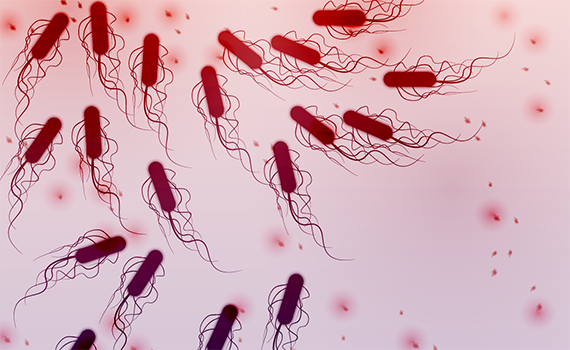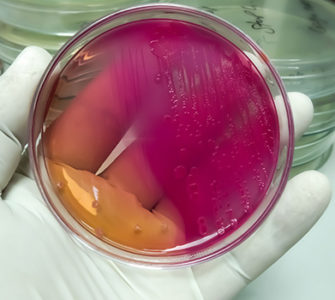Failure of maternal antibodies to protect against E. coli infection highlights need for early protection
Antibodies passed from mother to chick provide young birds with their earliest form of immune protection. However, new studies in broiler chicks show that maternal antibodies to Escherichia coli do not prevent infection, underlining the need for early protection against this ubiquitous and harmful pathogen.
E. coli infection — known as colibacillosis — is one of the most common and economically significant infectious diseases in poultry worldwide. In broilers, it’s linked to increased condemnations due to cellulitis and airsacculitis as well as inconsistent bird size and weights at processing.1
Pathogenic E. coli causes infection through exposure to contaminated feces, water and dust, so colibacillosis control in broilers typically relies on biosecurity and sanitation, with antibiotic treatment as needed. But as the industry faces pressure to reduce antibiotic use, Rita Weber, a poultry veterinarian at Zoetis, says broiler vaccination is gaining traction as an effective alternative.
“In the past, the strategy was to vaccinate breeders with the assumption that maternal antibodies would protect their chicks until the young birds’ own immune systems had a chance to develop,” she explains.
There was also concern that these maternal antibodies could interfere with vaccination early in the bird’s life, she adds, calling into question the cost-benefit of vaccinating broilers in view of their relatively short life span.
According to recent studies, however — conducted by Zoetis and presented at the 2019 World Veterinary Poultry Association Congress in Bangkok — maternal antibodies neither protect broiler chicks from colibacillosis nor interfere with E. coli vaccination.2
Furthermore, birds vaccinated at 1 day of age were significantly less likely to develop signs of colibacillosis than unvaccinated birds, demonstrating a clear benefit of vaccination.
Study design
The aims of the studies were 1) to ascertain the prevalence of maternal antibodies to E. coli in day-old specific-pathogen-free (SPF) chicks, and 2) understand onset of immunity in the presence of maternal antibodies.
Study 1
Lacking a suitable commercial diagnostic kit, researchers first needed to develop a method to detect E. coli. They started with pooled serum samples from three groups of 4-week-old SPF birds. One pool was from birds given a live E. coli vaccine by spray at 1 day of age; the second pool was from non-vaccinated birds that were infected with E. coli at 3 weeks of age (positive controls). The third pool was neither vaccinated nor infected (negative control). Based on these samples, the researchers developed an ELISA test to detect antibodies to E. coli.
Using this method, the researchers then examined serum samples from 40, 1-day-old SPF birds from parent stocks of different origin for antibodies, assumed to be maternally derived.
Study 2
In a subsequent study to test for protection against colibacillosis, three groups of 30, 1-day-old SPF chicks each were vaccinated by coarse spray with a live E. coli vaccine (Poulvac® E. coli) and challenged intratracheally with virulent E. coli at 7, 14 and 21 days of age, respectively. At every challenge time point, 30 non-vaccinated chicks were also infected and served as control. Seven days after each challenge infection, birds were euthanized and examined for colibacillosis lesions.
Maternal antibodies don’t protect against E. coli
Analyses confirmed the presence of maternal antibodies to E. coli in the 40 serum samples from day-old SPF birds. The source of flock did not seem to have significant effect on the presence of E. coli antibodies, the researchers observed. Virtually all chickens are exposed to E. coli during their lifetimes, they noted, so maternal antibodies are to be expected in their young.
The results also revealed a similar degree of colibacillosis lesions in vaccinated and non-vaccinated SPF chicks challenged at 7 days of age (Figure 1), thus demonstrating that maternal antibodies against E. coli do not protect against infection.
Figure 1: Percentage of colibacillosis lesions in Poulvac® E. coli vaccinated and non-vaccinated birds.
Vaccination effective in presence of maternal antibodies
According to Weber, it takes around 14 days post-vaccination to develop an immune response that can withstand a severe challenge infection, so no reduction in colibacillosis lesions was expected in vaccinated birds challenged on day 7. However, in the group challenged on day 14, she notes that vaccinated birds demonstrated a statistically significant reduction in colibacillosis lesions compared to non-vaccinated birds.
“These results reinforce our observation that maternal antibodies do not protect against E. coli,” she explains.
“Furthermore, the significant reduction in lesions in vaccinated birds shows that maternal antibodies do not interfere with the efficacy of the live E. coli vaccine we used in the study when administered on day 1,” she adds, highlighting that the result was even more pronounced in the group of birds challenged on day 21.
Based on these findings, Weber says live E. coli vaccination at 1 day of age is a safe and effective strategy for protecting broilers from colibacillosis and its costly consequences.
“There are no magic bullets when it comes to colibacillosis control and no substitutes for good hygiene, biosecurity and management,” she says. “However, day-1 vaccination helps ensure broilers develop a robust immune response from an early age, helping protect against disease, performance losses and condemnations as the industry moves to limit antibiotic use.”
1 http://www.poultryhub.org/health/disease/types-of-disease/colibacillosis/
2 Weber R,Rodenberg J. Maternal antibodies against Escherichia (E.) coli in newly hatched SPF chickens do not protect against infection and do not interfere with a live E. coli vaccine.., World Veterinary Poultry Association Congress 2019.
Posted on February 13, 2020


















